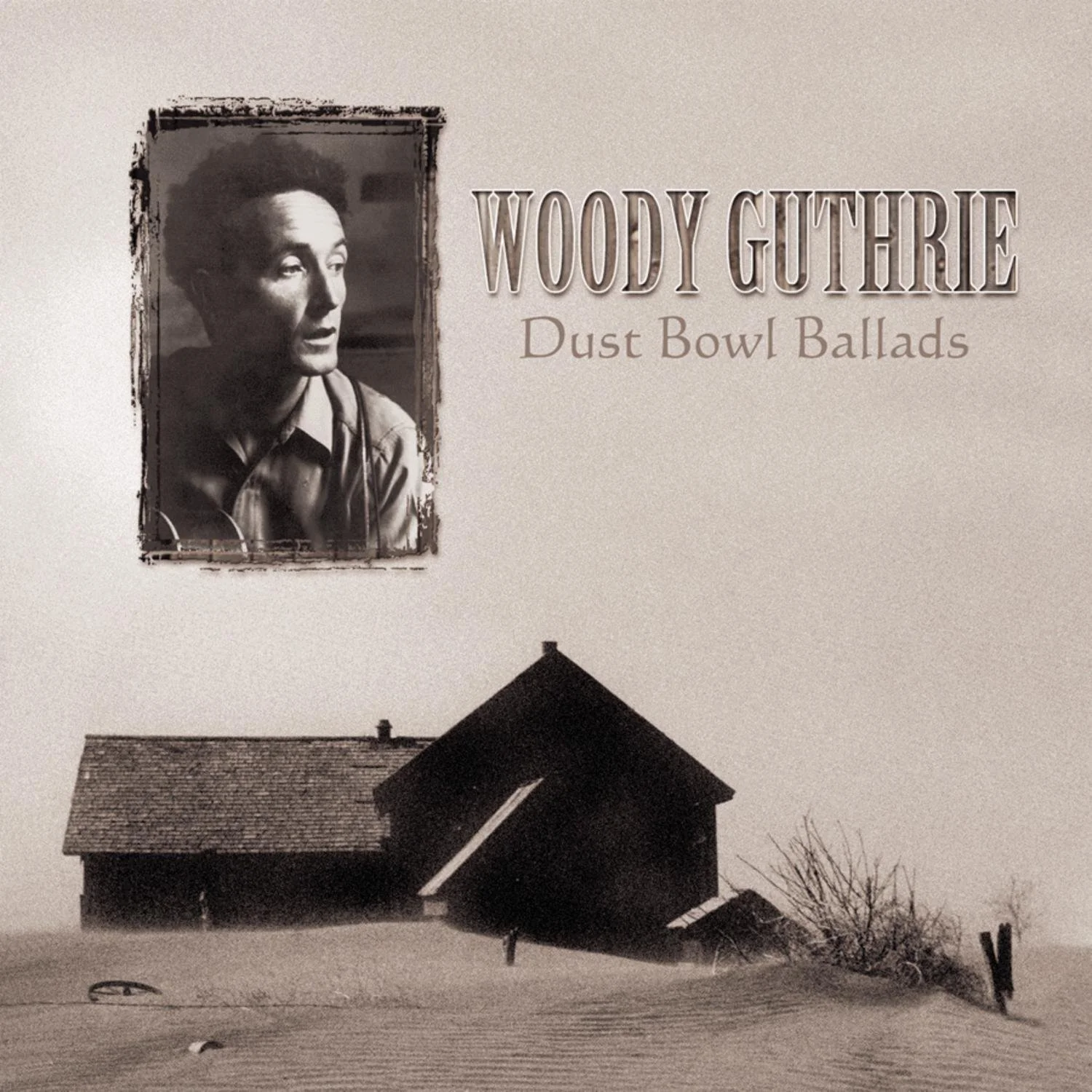WOODY'S "OTHER NATIONAL ANTHEM"
MANHATTAN, 1940 — All winter long the song was everywhere. On radio. “God Bless Amerrrica...” In restaurants and bars. “Land that I lovvvve.” In homes from the mountains to the prairies...
Hitchhiking toward New York, Woody heard it across the Plains and into Appalachia. Something in the song rankled him. Were these hobo camps blessed by God? These hungry people in bread lines? The Bowery bums he met when he reached the city? Blessed?
One snowy night, alone and adrift, he checked into a fleabag hotel off Times Square and began to write. The title came first. “God Blessed America.” Then some lines that had come to him on the road.
This land is your land
This land is my land. . .
The song is an American anthem now, sung in schools, used in commercials, recorded by everyone from Bruce Springsteen to the Mormon Tabernacle Choir. But Woody did not set out to write an anthem. He wanted an answer to a very American question— just whose country is this, anyway?
He considered it his, and few songwriters knew America as he did. By 1940, he had been on and off the road for five years. Born in Oklahoma, he married and moved to the Texas Panhandle where he wrote songs, poems, even an autobiography —all ignored. To make a living he painted signs. Then the dust came.
Woody’s “Dust Bowl Ballads” made fun of that “dusty ol’ dust” but the storms were living nightmares. They blackened the sky, choked lungs with “dust pneumonia,” baked the Plains and piled dust to the eaves. In 1935, the migration began, “Okies” like himself getting out. One day he joined them, heading for California.
In L.A., he made a name singing on radio., but while touring migrant labor camps he fell in with a left-wing crowd. “Left-wing, chicken wing,” he said, “it’s all the same to me.” But it wasn’t the same to the radio station. Fired, he hit the road, hitching, hopping freights back to Texas, then gone again. By the time his “hard travelin’” led him to Manhattan, he had absorbed the America that composer Irving Berlin had only read about. And Woody, as always, had something to say about it.
I rode that ribbon highway
I saw above me that endless skyway
I saw below me that golden valley
God blessed America for me.
He wrote five verses, then scrawled “All you can write is what you see.” He signed and dated it, February 23, 1940. Then he put it away, just another of 100 songs that would grow to a thousand. But there was something — gritty and real — in the lyrics...
The sun was shinin’ and I was strollin’
WIth the wheatfields wavin’ and the dust clouds rollin’
A voice was chanting, as the fog was lifting. . .
Two weeks after writing the song, Woody’s friend Will Geer (Grandpa Walton) booked him into a folk concert. There he met song collector Alan Lomax. Lomax instantly recognized the short, wiry singer with the Oklahoma drawl as an authentic American balladeer. With Lomax’s help, Woody began to record.
In April 1944, toward the end of a session, he took out his answer song. He changed one line and the title, made one take, then shipped out with the Merchant Marine. When the war ended, Woody settled in Coney Island with a new wife, new children. Arlo recalls his father teaching him the song’s “other” verses that Woody feared would be forgotten.
As I was walkin’ I saw a sign there
And the sign said “No Trespassin’”
But the other side, it didn’t say nothin’
That side was made for you and me.
Woody Guthrie inherited Huntington’s disease from his mother, whom it drove mad. By 1952, the debilitating nerve disease had him twitching, flailing, bed-ridden. His last public appearance came in March 1956 when friends arranged a benefit concert. As Pete Seeger led the sing-a-long, the spotlight rose to the balcony. There a short, wiry, embattled man stood and held up a shaky fist. The audience burst into applause, then went back to singing.
I’ve roamed and rambled and followed my footsteps
Through the sparkling sands of her diamond deserts
And all around me a voice was sounding
This land is made for you and me
When he died in 1967, Woody was in the pantheon of American folk. His anthem had been recorded by dozens. Changes in lyrics adapted it to claim “this land” in Germany, Sweden, Wales, Turkey, Mexico. . . Many, including Robert F Kennedy, said it should be our national anthem. No one today makes such claims, but “This Land is Your Land” has a cherished place in our lore. Even without the “other” verses, it is our other national anthem.
“I hate a song that makes you think you are just born to lose,” Woody wrote. “Bound to lose. No good to nobody. No good for nothing. . . I am out to sing songs that will prove to you that this is your world. . . And the songs that I sing are made up for the most part by all sorts of folks just about like you.”













